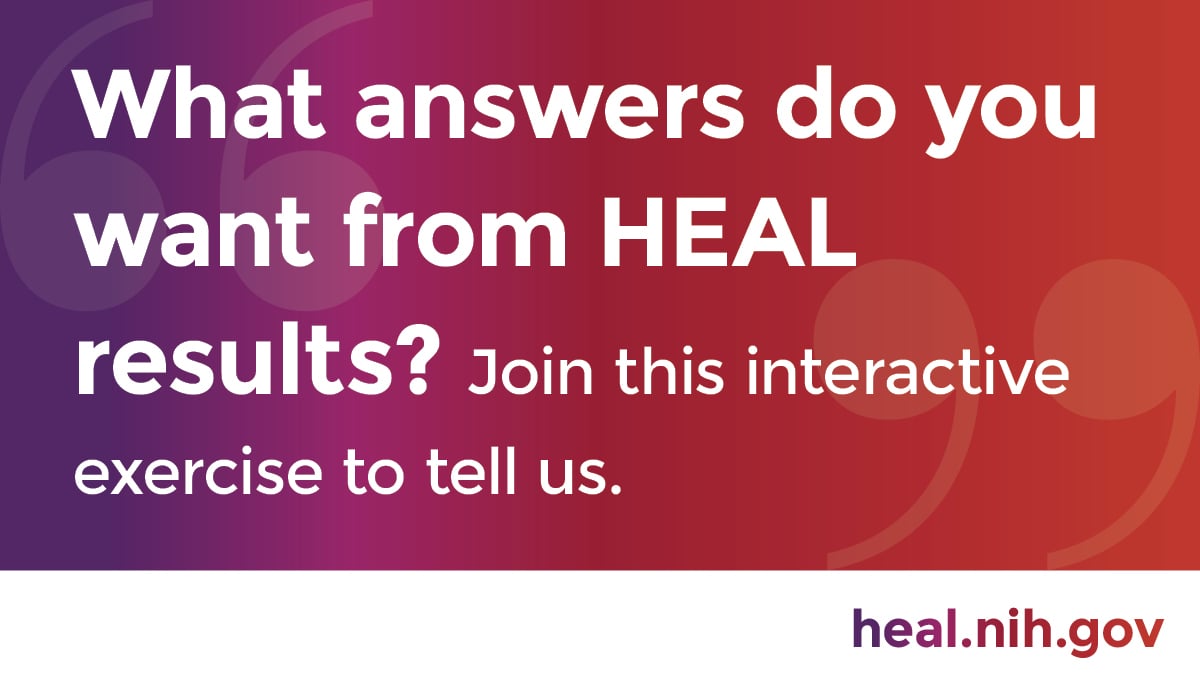Making HEAL Data Speak: Finding Scientific Solutions for People and Communities
Dear HEAL Community,
HEAL research is addressing the urgent public health crisis of opioid misuse, addiction, and overdose that demands teamwork, maximum transparency, and speed. We have a responsibility to deliver as quickly as possible the results of HEAL research so people can make evidence-based decisions about treatment, and so we can continue to find more scientific solutions for people and communities in need.
HEAL has worked hard over the past 2 years to build a comprehensive data ecosystem that will help people and communities affected by the opioid crisis through maximal data sharing and re-use. Achieving this goal means making sure all HEAL data are Findable, Accessible, Interoperable, and Reusable. Everyone in the HEAL Community is part of this ecosystem (see "Be a Part of the Change" section below). It is the glue for connecting results to people and communities who need help now.
Data as a Great Equalizer
Data speak a language that goes beyond any research discipline and is independent of any one creator or user. Data are also the record of scientific progress: Every experiment that generates a result creates data. That could be a measure of blood pressure, height, or pain intensity. It could be the number of people in a community who survived an overdose. It could be a CT or MRI scan, or even a tally of people’s views about a topic such as addiction or stigma.
To make data useful, a set of standard terms or metadata are used to compare and share – ultimately enabling data to be transformed into treatments and other products for patients. An easy-to-understand example of metadata terms might be a song’s title, artist, recording year, album, and genre. The music itself represents the data, but all the other information helps us recognize it – and search for it (and songs like it) in a music library. In the context of HEAL, the term “medication for opioid use disorder” is metadata for buprenorphine or methadone. So, a searcher need not know the specific name to get useful information.
Metadata terms need to be set up ahead of time. The HEAL Data Ecosystem team has defined a set of descriptive categories, metadata, that will allow HEAL data to speak many languages. This work helps different types of people find data because it is labeled well for diverse audiences. For example, a provider looking for clinical evidence about a pain treatment. Or a state health department employee who wants to know how to implement an opioid treatment plan in jails and prisons. Or a scientist searching for how well a certain compound gets into the brain. Or a social worker who is trying to map out a care plan for an individual with chronic pain and depression.
HEAL Researchers: Be a Part of the Change
The good news for HEAL-funded scientists is that we have made the data sharing process straightforward by laying out simple steps to follow when data collection begins. If you have HEAL research funding, the two most important things to do are:
- Choose where you will keep your data. Help is freely available for those who need it through the HEAL Data Stewards, a contracted resource available to all HEAL investigators.
- Register your study with the HEAL Data Platform, an innovative, cloud-based workspace for finding, sharing, analyzing, and downloading HEAL data securely and efficiently.
Like a biological ecosystem such as a forest, the HEAL Data Ecosystem is a living, changing environment. A dedicated group of HEAL-funded scientists, the HEAL Collective Board, has been guiding us in building these resources and making them nimble, easy to use, and understandable. An exciting new opportunity for more guidance is coming soon with the NIH HEAL Initiative® Research-Dissemination and Engagement Center, who will be charged with creating meaningful connections with communities all across America who need reliable and understandable information to help people who suffer from physical and emotional pain.
Open science is good science that lays the fastest pathway for turning discoveries into tangible benefits for people. Everyone in the HEAL Community has the responsibility to share data early and often. The HEAL Data Ecosystem and its cloud-based environment for sharing and analyses is only as good as we make it, together.
As always, share information about HEAL with your networks and remember that we want to hear from you. It just takes a quick email to HEALquestion@od.nih.gov.
 U.S. Department of Health & Human Services
U.S. Department of Health & Human Services

